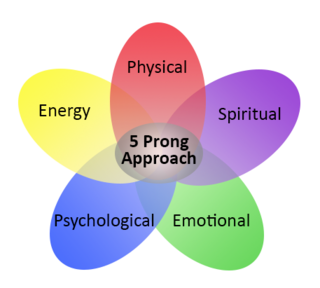Anxiety
Are You Simply Treating Your Symptoms?
If you want to feel better, you need to treat both the symptoms and the cause.
Posted March 17, 2020
Our bodies have many ways of telling us that we are not feeling well. These ways include sneezing, sweating, coughing, insomnia, or feeling aches and pains. These are called symptoms. Symptoms are physical and/or mental features that indicate an underlying condition or disease. This condition or disease is the cause of the symptoms.
While it is natural to want to treat the symptoms, it’s important to determine and treat the cause.
If you have a runny nose, this is a symptom that something is going on in your body. You could have allergies, a virus, or a bacterial infection. It could also be caused by a sensitivity to specific smells or simply just from crying.

To stop the runny nose, you will likely use lots of tissues and perhaps take an over-the-counter remedy. These ways treat the symptom, the runny nose. To stop the symptoms, you need to figure out the actual cause. For instance, taking an antibiotic for a runny nose caused by an allergy won’t stop your nose from running. You would need to figure out what is causing your allergies and then take the right medicine or eliminate the allergen.
Complexity of causes.
It is not always easy to determine the cause of your symptoms. In order to truly overcome your symptoms, you need to treat or eliminate the cause. In some cases, symptoms can be a result of complex causes occurring at the same time, such as pain, anxiety, and trauma.
To better understand the complexity of causes, I would like you to imagine this scenario. You are standing outside a window on a chilly day. Looking inside the window, you can see a woman sitting in a chair near a roaring fire in a fireplace. She looks to be about 45 years old. Looking closer, you can see she is perspiring. Sweating is the symptom.
What is the cause of her sweating?
- Is the temperature in the room too hot?
- Does she have a fever?
- Is she anxious or nervous?
- Does she have food poisoning?
- Does she have diabetes?
- Is she having a hot flash?
The potential answers range from having all issues individually or concurrently.
So, it is extremely important to differentiate which cause ranks the highest in order to find the appropriate solution to help her. The solution would be the methods to treat the cause.
I have seen people who had emotional symptoms caused by a brain injury. And others with the same types of emotional symptoms caused by hormonal imbalance or infection.
A friend of mine developed a urinary tract infection (UTI) causing symptoms that landed her in a psychiatric ward. Symptoms such as confusion, mental disturbances, and disorientation can result from a UTI, more commonly affecting older people. Another person I know was committed to a psychiatric ward from symptoms of Lyme Disease. Emotional symptoms presented in both cases. Yet, not as a result of chemical imbalance of neurotransmitters, such as serotonin. The symptoms were caused by undiagnosed and untreated bacterial infections. They needed antibiotics, not psychiatric care!
Current treatment methods simply address the symptoms and not the cause. In some situations, the causes are never addressed and a person lives with ongoing symptoms.
5 Prong Approach
In my practice, we use an approach that I developed. Dr. Diane®‘s 5 Prong Approach, an integrative approach to evaluating presenting symptoms.

Regardless of the presenting problem or situation, we view the whole person from five distinct views: physical, psychological, emotional, spiritual, and energy. Often these areas intertwine.
Looking for the core issue from this vantage point allows for a concise individualized treatment program to be developed to address the presenting symptoms.
Physical
The physical aspect includes any current physical condition or prior injury to your brain or body. Genetics play a very important role in the physical area. When you go to your doctor, they ask about your family history. If there is a history of heart issues, diabetes, and/or cancer, for example, you are at a higher risk of getting this. In my situation, my mother, uncle, and cousin all had some form of lymphoma or leukemia, and my first cousin had Hodgkin’s Lymphoma, so it was no shock that I developed Hodgkin’s Lymphoma.
Not all physical issues are caused by genetics, of course, there are accidents and injuries and infections. Research in microbes shows how viruses and bacteria affect the gut and brain, leading to a wide variety of physical and mental symptoms, including anxiety, hormonal imbalance, mood disorders, and many more. Thus, it is extremely important to clearly evaluate the cause of these symptoms.
Emotional
If you have experienced attachment issues, neglect, physical or emotional abuse, sexual abuse, or a traumatic event, such as witnessing a mass shooting you may have emotional issues. Depending on when these events occurred, your symptoms of anxiety or sleep problems may be the result of developmental trauma disorder or complex trauma or PTSD. A brain injury or concussion can also cause emotional issues. Yes, it is important to address sleep and anxiety, however, clearly, the treatment of both is vastly different.
Psychological
Psychological includes biochemical variations in hormones and neurotransmitters and neuromodulators and basic temperament.
Physical and mental symptoms can be caused by an imbalance in neurotransmitters (acetylcholine and GABA) and neuromodulators (serotonin and dopamine). Imbalance of neurotransmitters and neuromodulators causes symptoms seen in sleep disorders, mood disorders, anxiety, racing thoughts, and delusions.
Spiritual
The spiritual component relates to how you feel connected to God, the universe, or one another.
Symptoms of anxiety, insomnia, depression, and apathy are some symptoms that can be caused by a disconnect to nature and the universe. You do not have to belong to a religious organization or a specific belief system. The intrinsic universal connection to all living things in and of itself is a healing power. The absence of it, in many cases, is the main cause of many symptoms and illnesses.
Energy
The energy component relates to the universal energy in your body around all living things, called, "Chi” or “Qi." The study and understanding of subtle energy go back over 4,000 years. Chinese and Asian medicine first discovered this and presented the various meridians of the body. From this evolved Chi Gong, Polarity, and Reiki, to name a few types of treatments to balance “Chi” in the body. Imbalance of "Chi” can cause symptoms of anxiety, cognitive issues, sleep problems, chronic pain. Not to be confused with physical or emotional causes.
Consider All the Symptoms
By considering all symptoms, a determination of further testing and evaluations may be needed.
These could include:
- Endocrine evaluation of hormones and hormone levels, along with levels of various vitamins such as B6, B-12 or D and amino acid.
- Nutritional evaluation to adjust foods and nutrients that might be causing various symptoms.
- EKG or stress test to assess cardiac function.
- Brain functioning assessments, such as Quantitative EEG, called a QEEG, and Spec Scan.
- Neuropsychological testing to evaluate emotional, cognitive, and processing abilities in your brain.
- Energy assessment – there are various standardized methods used in Energy Psychology from muscle testing and evaluation of chakras. Advanced Acupuncturist have various methods of evaluating energy blockage in the body.
Individualized Treatment Program
There are still many practitioners who embrace this integrative approach and can prescribe treatment programs for both symptoms and causes. However, our current medical system and health insurance system has caused many skilled clinicians to limit patient appointments to 15 minutes. And many valuable tests are not covered by insurance.
Conclusion

If you want to overcome symptoms you need to treat the cause(s) of those symptoms. Using the 5 Prong Approach you can encourage your medical or alternative medical team to explore the various components that make up the 5 Prong Approach and find the specific treatment for that component(s) that is causing your symptom. Then and only then, along with your desire to overcome your symptoms will it come to be.
The latter component is extremely important. For over the years, I’ve treated people who believe nothing can help them, and you know what? They are correct. They choose to remain unwell. When doctors told me I would not regain my life again after brain injury and that I would never walk or talk the same, I choose to believe I could regain my life. And I did. This belief relates to the spiritual aspect.
There is a Way!®
Dr. Diane®
© 2020 DR. DIANE® ROBERTS STOLER, ED.D.




